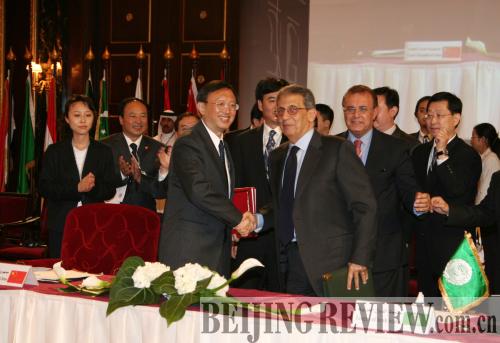|
 |
|
BRIDGING A GULF: Chinese Foreign Minister Yang Jiechi (front left) congratulates Amr Moussa, Secretary General of the League of Arab States, on the signing of a Sino-Arab cooperative agreement during the China-Arab States Cooperation Forum's third ministerial conference in Manama, the capital of Bahrain, on May 21, 2008 (LI ZHENSHE) |
Lastly, from the aspect of security, Arab nations attach great importance to regional peace and stability. Thus they are strengthening antiterrorism measures, while making extensive efforts to counter all types of criminal activity. China needs to work together with them to combat terrorism, separatism and extremism and maintain the security of its western border regions.
Unprecedented opportunities
Today, relations between China and Arab countries are at their best in any time in history. There are neither lingering historical disputes, nor disagreements regarding fundamental interests between the two sides.
It is worth noting that Arab countries increasingly rely on China, with the aim of seeking economic benefits. They have also become interested in China's development mode, and have been studying it in a bid to use China's experience to solve their own problems. In addition, the China-Arab States Cooperation Forum has made great strides in promoting bilateral cooperation.
Arab countries appreciate China's standpoint of never seeking hegemony, never interfering in other countries' internal affairs and supporting the peace process in the Middle East.
The Arabs have proven to be good friends to China, all hoping to forge stronger ties with Beijing. This has provided China with a strong political basis with which to maintain good relations with Arab countries.
Hit severely by the overwhelming global financial crisis, Western countries, including the United States and European nations, have no extra energy to expand their trade with Arab countries.
In this context, Middle Eastern countries, especially oil-exporting countries, have chosen to pursue an "eastward strategy" to reverse their huge economic losses in the West. All these have created a favorable environment with which China can enter the Arab region.
Moreover, U.S. President Barack Obama has expressed the wish to strengthen cooperation with other major powers, including China, in terms of safeguarding stability in the Middle East, combating terrorism and criminal activity in the region, and resolving the Israeli-Palestinian conflict. The policy change of the Obama administration allows China to play a bigger role in the Middle East.
Seeking harmony
China, meanwhile, has enhanced the status of Arab countries in its overall foreign strategy.
To improve efforts in the Middle East, China needs to strengthen coordination with the United States. In terms of controversial issues such as Middle East security, antiterrorism and the Iranian nuclear issue, China should try to find common ground with the United States through effective communication.
As for the Israeli-Palestinian dispute and Iraq security, China should play its unique role by advocating dialogues for peace. Wu Sike, China's Special Envoy to the Middle East, said at a media briefing in August that China could pursue its role in promoting the Middle East peace process both through bilateral contacts with countries in the Middle East and by working with multilateral organizations, such as the UN. As a permanent member of the UN Security Council, China supports all programs, proposals and actions conducive to the Middle East peace process, he said.
When it comes to economic cooperation with Arab countries, Chinese companies ought to take into consideration the concerns and long-term interests of local Arab people. They are also expected to contribute to social programs so that they can better integrate into local society.
In terms of bilateral trade, China should accommodate the interests of smaller countries in the region. It should upgrade the variety of its exports, while reducing the export of cheap textiles.
Finally, it is essential for China to provide both economic and humanitarian assistance for Arab countries suffering from poverty or natural disasters.
| 